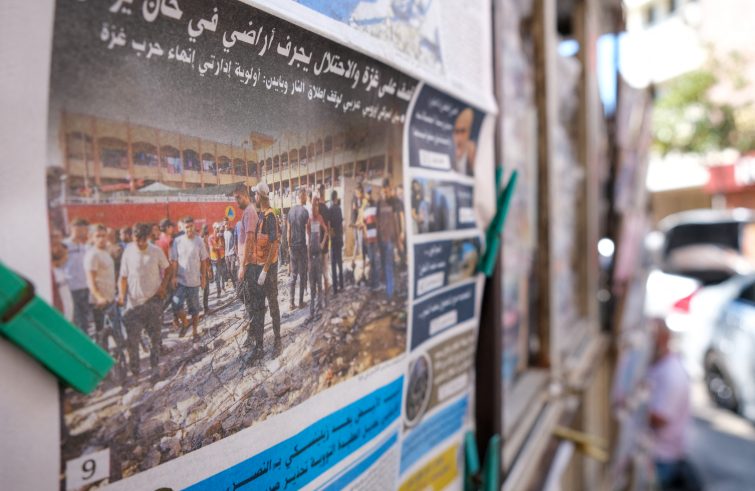
“The assassination of Hassan Nasrallah inflicted a wound in the hearts of the Lebanese people”, said Maronite Patriarch Cardinal Béchara Boutros Raï, commenting on the death of the Hezbollah leader following an Israeli airstrike on Beirut on the night of Friday 27 September.
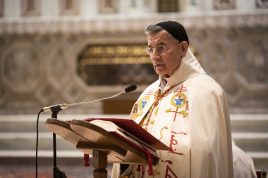 The Maronite Patriarch commemorated the victims of the recent attacks, prayed for the healing of the wounded, and called for peace to be achieved “through negotiations and diplomatic means, because in war everyone loses,”, he said in his homily during Sunday Mass in Dimane, the Patriarch’s summer residence, located 100 kilometres from the Lebanese capital and 30 kilometres from the coastal city of Tripoli. In his homily, published on the website abouna.org., the Maronite Patriarch called for “the unity of the Lebanese people, sustained by the testimony of so many Christian and Muslim leaders who believed in the cause of truth, justice and support for the weakest, highlighting the values of honesty and loyalty to the good of their homeland.” For the Cardinal, this legacy “should motivate us to defend Lebanon against all forms of aggression” and “to elect a President of the Republic who will restore Lebanon’s place among the nations.” As known, the Country of the Cedars has been without a head of state for the last two years (he must be a Maronite Christian as stipulated in the constitution, Ed.’s Note) due to cross-party vetoes in Parliament, where Hezbollah has 13 seats but the political bloc that supports it controls 62 out of 128 seats.
The Maronite Patriarch commemorated the victims of the recent attacks, prayed for the healing of the wounded, and called for peace to be achieved “through negotiations and diplomatic means, because in war everyone loses,”, he said in his homily during Sunday Mass in Dimane, the Patriarch’s summer residence, located 100 kilometres from the Lebanese capital and 30 kilometres from the coastal city of Tripoli. In his homily, published on the website abouna.org., the Maronite Patriarch called for “the unity of the Lebanese people, sustained by the testimony of so many Christian and Muslim leaders who believed in the cause of truth, justice and support for the weakest, highlighting the values of honesty and loyalty to the good of their homeland.” For the Cardinal, this legacy “should motivate us to defend Lebanon against all forms of aggression” and “to elect a President of the Republic who will restore Lebanon’s place among the nations.” As known, the Country of the Cedars has been without a head of state for the last two years (he must be a Maronite Christian as stipulated in the constitution, Ed.’s Note) due to cross-party vetoes in Parliament, where Hezbollah has 13 seats but the political bloc that supports it controls 62 out of 128 seats.
Cardinal Bechara Rai called on the international community “to take serious action to stop this deadly cycle of war, bloodshed and destruction throughout the country, and to pave the way for a just peace that recognises the rights of all the peoples and communities in the region.”
He concluded: “The time has come for the Lebanese people to realise that they have no one to help them but themselves. They must stand united and in solidarity with each other, dedicated to addressing the challenges of the Lebanese national home,” in keeping with the principles of the 1943 National Pact, which stipulates the distribution of political power on the basis of the Country’s various religious faiths. The Lebanese National News Agency (NNA) reported that less than two weeks ago, while celebrating Mass in Mayfouk, the Patriarch warned against those who seek to destabilise the country from within. “There are factions in our society,” the Cardinal said, “who want Lebanon to be a barren land where they can carry out their plans without the interference of a State, of its laws or its constitution. They want it to be a part of their possessions and not their homeland.” The Maronite Patriarch had repeatedly voiced his discontent with Hezbollah, which he said was responsible for embroiling Lebanon in regional conflicts.
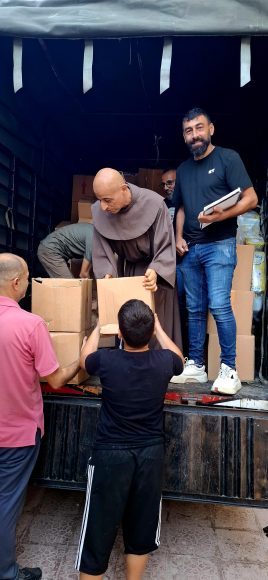 The stories of Sila and Abbas. The testimony of the parish priest, Father Toufic Bou Merhi, comes from the Franciscan convent of the Custody of the Holy Land in Tyre. “The area where we live is targeted by bombing and shelling. “The bombs fell until dawn on Saturday – he told SIR. Last Monday we opened the doors of our convent to the displaced, many of them frightened children. Many families have lost everything. A rocket hit and destroyed nine houses in a low-income area of the city, just 50 metres from the convent. The rocks hit our courtyard, causing widespread fear and panic. The tears of the people mingled with the blood of the wounded. Entire families were wiped out. With us is six-year-old Sila, she has no one: her father, mother, 18-month-old sister, grandparents, aunts and uncles are all dead”, says the Franciscan priest. Stories of despair intertwine: “Abbas, who had a large family, arrived at the monastery and offered to cook pita, the typical Lebanese bread, for all the displaced people.
The stories of Sila and Abbas. The testimony of the parish priest, Father Toufic Bou Merhi, comes from the Franciscan convent of the Custody of the Holy Land in Tyre. “The area where we live is targeted by bombing and shelling. “The bombs fell until dawn on Saturday – he told SIR. Last Monday we opened the doors of our convent to the displaced, many of them frightened children. Many families have lost everything. A rocket hit and destroyed nine houses in a low-income area of the city, just 50 metres from the convent. The rocks hit our courtyard, causing widespread fear and panic. The tears of the people mingled with the blood of the wounded. Entire families were wiped out. With us is six-year-old Sila, she has no one: her father, mother, 18-month-old sister, grandparents, aunts and uncles are all dead”, says the Franciscan priest. Stories of despair intertwine: “Abbas, who had a large family, arrived at the monastery and offered to cook pita, the typical Lebanese bread, for all the displaced people.
While he was cooking, a rocket hit his house and killed him. Only his young son, who was not with him at the time, survived. The last body in a family of 12 was pulled out of the rubble yesterday.
A massacre.”
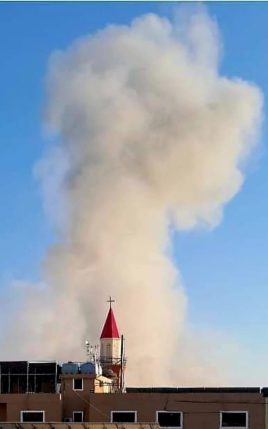 Letter to the bombs. “Enough, enough! We can’t take it any more!” Father Toufic cried out during Sunday Mass. The Franciscan priest entrusted his cry to a letter addressed to the bombs and rockets falling on Lebanon, which was read out during the Sunday service. The priest, who was born in Lebanon, has lived through wars since he was five years old, and there seems to be no end in sight: “Dearest bomb, I beg you, leave us alone”, reads the letter. “Dearest missile, do not explode. Do not obey the hand of hatred. I am turning to you because the hearts of those who are in a position of responsibility have hardened. They call you smart bombs, be smarter than those who use you.
Letter to the bombs. “Enough, enough! We can’t take it any more!” Father Toufic cried out during Sunday Mass. The Franciscan priest entrusted his cry to a letter addressed to the bombs and rockets falling on Lebanon, which was read out during the Sunday service. The priest, who was born in Lebanon, has lived through wars since he was five years old, and there seems to be no end in sight: “Dearest bomb, I beg you, leave us alone”, reads the letter. “Dearest missile, do not explode. Do not obey the hand of hatred. I am turning to you because the hearts of those who are in a position of responsibility have hardened. They call you smart bombs, be smarter than those who use you.
There is no one left to kill.
“The Lord has nothing to do with hatred, He created love, but man has rejected it”, continues the text. “What sin have we committed to deserve such a severe punishment? This land, blessed by the Lord and desecrated by man, is perhaps our only sin.”
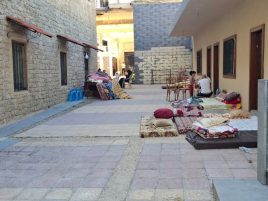 “Our sin is to have been born in this country, which has endured a war for more than 50 years, and to have paid the price instead of others.”
“Our sin is to have been born in this country, which has endured a war for more than 50 years, and to have paid the price instead of others.”
The convent is currently providing shelter for 160 people in addition to approximately ten with special needs. The provision of basic necessities is often challenging due to lack of electricity and water shortages: “we are using cisterns, but Divine Providence ensured that we lacked nothing so far,” states the priest. “However”, added Father Toufic, “we don’t know for how much longer we will manage to go on like this. The situation is increasingly tense, and we have been advised to leave for security reasons, but we will not abandon these people.”
They are terrified. All we can do at the moment is to stay with them, give them shelter and love. They are all Muslims: hunger, thirst, cold, fear and pain have no religion or colour.”
Phosphorus oil. The thoughts of the Franciscan friar and his confrere, Father Peter, go to the nearby Christian village of Deir Mimas, two kilometres from the Israeli town of Metula and the neighbouring town of Kyriat Shmona, on the Israel-Lebanon border. Every Sunday, Father Toufic fills his car with food parcels and, despite the rockets and the bombs, drives 30 kilometres to deliver them to the few remaining believers and to celebrate Holy Mass for them. “Unfortunately,” he says, “the roads are closed these days and getting there is impossible. Whenever we can, we talk on the phone. Everyone is doing well for now. The village depends on the cultivation of olive trees for its livelihood. The olive oil of Deir Mimas is considered to be of the highest quality in all of Lebanon. “The olive oil that is produced there,” says the priest, “was awarded international prizes in 2023. Unfortunately, this year the olive oil is being analysed in laboratories to see if it contains phosphorus. The same substance used in the bombs dropped by aircraft. This is a disgrace and all we can do is shout: ‘Enough!”









